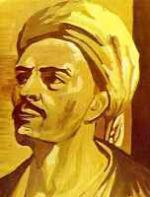Knowledge should mean a full grasp of knowledge:
by Yunus EmreEnglish version by Namik Kemal Zeybek
Original Language Turkish
Knowledge should mean a full grasp of knowledge:
Knowledge means to know yourself, heart and soul.
If you have failed to understand yourself,
Then all of your reading has missed its call.
What is the purpose of reading those books?
So that Man can know the All-Powerful.
If you have read, but failed to understand,
Then your efforts are just a barren toil.
Don't boast of reading, mastering science
Or of all your prayers and obeisance.
If you don't identify Man as God,
All your learning is of no use at all.
The true meaning of the four holy books
Is found in the alphabet's first letter.
You talk about that first letter, preacher;
What is the meaning of that -- could you tell?
Yunus Emre says to you, Pharisee,
Make the holy pilgrimage if need be
A hundred times -- but if you ask me,
A visit to the heart is best of all.
<<Previous Poem | More Poems by Yunus Emre | Next Poem >>

/ Image by Amosb /
Knowledge should mean a full grasp of knowledge:
Knowledge means to know yourself, heart and soul.
If you have failed to understand yourself,
Then all of your reading has missed its call.
Sages of all lands keep reminding us that the spiritual journey is a journey of awareness, and specifically self-awareness. It is not a journey of acquisition. Or intellect. Or adherence to rules.
It is not a matter of how many books we've read. Or how many times we've read them. The only question of any value is whether we've yet recognized their truths... within ourselves.
It is not a matter of how often we pray. Or how perfectly we enunciate each prescribed word. The question is, have we discovered how true prayer wells up within us of its own accord.
This poem is clearly a mystic's critique of the religious rule-follower, typically someone who favors a rigid understanding of religion that lacks compassion or deep insight. But, as I think about it, the words of this poem can also be turned around and cause us to question elements of our own spiritual seeking, as well. We may not approach the spiritual path as a matter of superficial actions or brittle creeds, but we also can become swept up in endless new ideas, new flashes of insight, new pathways, new teachers. This can lead to a culture of lifelong seeking that becomes our comfort zone -- we seek and we seek, and perhaps we deepen and gain insight, but we can forget to actually find.
I think that is Yunus Emre's real criticism here, not just directed at the superficially religious or the rigidly minded, but this idea of a culture that takes on the form of religion (or spirituality) without actually discovering the true center that gives it all meaning.
The true meaning of the four holy books
Is found in the alphabet's first letter.
You talk about that first letter, preacher;
What is the meaning of that -- could you tell?
When Muslims speak of the “four holy books,” they are referring to the Quran, the Christian New Testament, the Torah and the Psalms. In general, it is a reference to the Judeo-Christian-Muslim family of religious tradition and the recognition that they are all worshipping the same God.
As to the statement that “the true meaning of the four holy books is found in the alphabet's first letter,” here's how I understand that. There is a lot of religious symbolism associated with the letters of the alphabet. For example, there is the Christian formulation of Christ as the alpha and the omega, or the beginning and the end. The first letter of the alphabet is, naturally, the beginning, the source, the origin point. It precedes all other letters, making words, and thus creation possible. We can say that the first letter of the alphabet is the seed from which reality is born. As such, it is particularly associated with God as the Father-Mother of all things. When we understand the Source, the first letter, we have gotten to the heart of reality and truly understand religion. If not, we may still rely on that first letter, we may speak and write in endless combinations of words, but is that real understanding? It's all about truly knowing that first letter, the Source.
Make the holy pilgrimage if need be
A hundred times -- but if you ask me,
A visit to the heart is best of all.
Follow each prescribed step of the journey, and bring books, but what we seek is found only and always in the heart of the heart as the origin of all things.
A warm-hearted nudge to us all...
